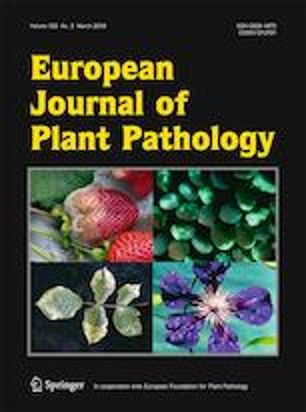Ver ítem
- xmlui.general.dspace_homeCentros e Institutos de InvestigaciónCIAP. Centro de Investigaciones AgropecuariasInstituto de Patología VegetalArtículos científicosxmlui.ArtifactBrowser.ItemViewer.trail
- Inicio
- Centros e Institutos de Investigación
- CIAP. Centro de Investigaciones Agropecuarias
- Instituto de Patología Vegetal
- Artículos científicos
- Ver ítem
Effect of rhizomania on red table-beet biomass production and molecular characterization of an isolate of Beet necrotic yellow vein virus from Brazil
Resumen
In Brazil, Beet necrotic yellow vein virus (BNYVV), which causes rhizomania in red table-beet (Beta vulgaris subsp. vulgaris), was first reported in 2015. This study evaluated the pathogenic effects of the disease on biomass production of red table-beet plants under field conditions. The effect of rhizomania infection depended on the season when the experiment was conducted. BNYVV infection had no effect on dry weight of aerial parts of plants growing in
[ver mas...]
In Brazil, Beet necrotic yellow vein virus (BNYVV), which causes rhizomania in red table-beet (Beta vulgaris subsp. vulgaris), was first reported in 2015. This study evaluated the pathogenic effects of the disease on biomass production of red table-beet plants under field conditions. The effect of rhizomania infection depended on the season when the experiment was conducted. BNYVV infection had no effect on dry weight of aerial parts of plants growing in autumn, and a marginal effect on storage roots, reducing the weight by 27.5%. In spring, rhizomania significantly reduced the dry weight of aerial parts by 48% and the storage-root weight by 64.6%. The presence of the possible vector Polymyxa betae was confirmed by PCR and subsequent nucleotide sequencing. The near-complete genome of a BNYVV isolate from Brazil was determined using high-throughput sequencing; the homologous sequence of the RNA-5 genome segment was not identified. The BNYVV genome of the Brazilian isolate was very similar to the type BNYVV-S isolate.
[Cerrar]

Autor
Camelo García, Viviana Marcela;
Edwards Molina, Juan Pablo;
Nagata, Tatsuya;
Rezende, Jorge A. M.;
Silva, João M. F.;
Fuente
European journal of plant pathology (20 March 2019)
Fecha
2019-03-20
Editorial
Springer
ISSN
0929-1873
1573-8469 (Online)
1573-8469 (Online)
Formato
pdf
Tipo de documento
artículo
Palabras Claves
Derechos de acceso
Restringido
 Excepto donde se diga explicitamente, este item se publica bajo la siguiente descripción: Creative Commons Attribution-NonCommercial-ShareAlike 2.5 Unported (CC BY-NC-SA 2.5)
Excepto donde se diga explicitamente, este item se publica bajo la siguiente descripción: Creative Commons Attribution-NonCommercial-ShareAlike 2.5 Unported (CC BY-NC-SA 2.5)
Metadatos
Mostrar el registro completo del ítemÍtems relacionados
Mostrando ítems relacionados por Título, autor o materia.
-
Relative incidence of cucurbit viruses and relationship with bio-meteorological variables
Pozzi, Elizabeth Alicia; Bruno, Cecilia Inés; Luciani, Cecilia; Celli, Marcos Giovani; Conci, Vilma Cecilia; Perotto, Maria Cecilia (Springer, 2020-02)Environmental heterogeneity can shape the plant-virus relationship, furthering the appearance of new diseases in crops, or altering disease incidence and severity. In this work, we studied the virus association with ... -
Virosis en zapallito de tronco
Perotto, Maria Cecilia (EEA San Pedro, INTA, 2022)Las principales virosis que afectan al zapallito redondo son las producidas por virus del género Potyvirus. Hay 4 especies de este grupo presentes en Argentina, estos son: Watermelon mosaic virus (WMV), Zucchini yellow ... -
Enfermedades del Poroto
Ploper, Leonardo Daniel; González, Victoria del V.; Rodriguez Pardina, Patricia; Díaz, Cecilia G.; Vizgarra, Oscar Nicéforo (Asociación Argentina de Fitopatólogos, 2024)El género Phaseolus (familia Fabaceae) está compuesto por más de 70 especies botánicas originarias de Mesoamérica y América del Sur. Incluye varias especies de interés hortícola, entre las que se pueden mencionar P. vulgaris ...

